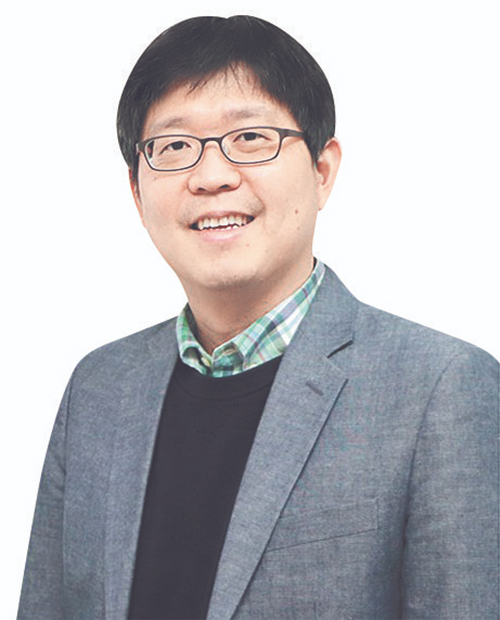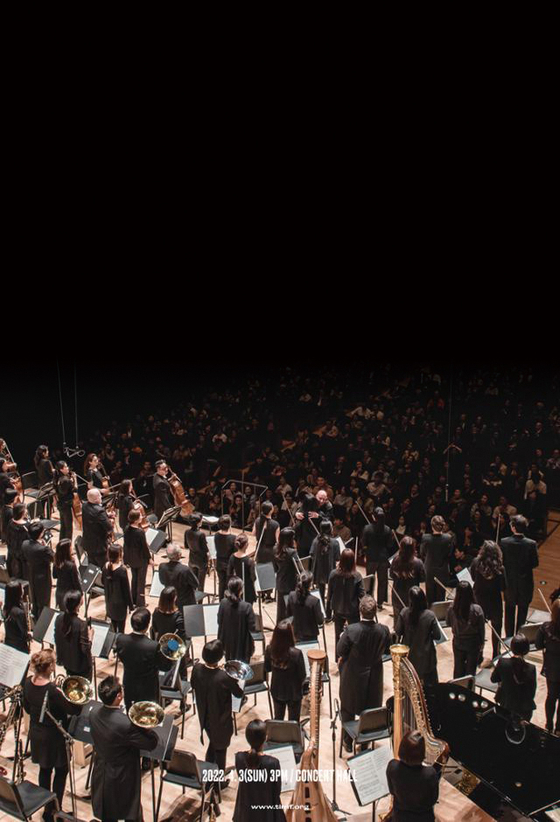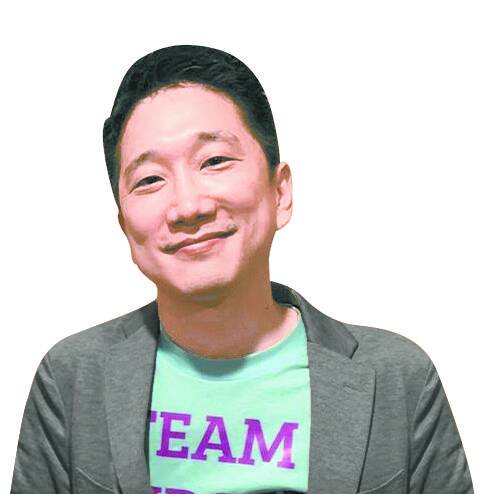Yumin Awards celebrate their 13th year
전체 맥락을 이해하기 위해서는 본문 보기를 권장합니다.
"With existing technologies, we can make an invisibility cloak whose diameter is 1 centimeter," he said. "[To make a larger invisibility cloak] there are technological barriers. The current cloak is close to a transparent screen rather than a fabric that can bend."
"The idea [to host an international music festival] was met with skepticism and pessimistic views."
이 글자크기로 변경됩니다.
(예시) 가장 빠른 뉴스가 있고 다양한 정보, 쌍방향 소통이 숨쉬는 다음뉴스를 만나보세요. 다음뉴스는 국내외 주요이슈와 실시간 속보, 문화생활 및 다양한 분야의 뉴스를 입체적으로 전달하고 있습니다.
![Recipients of the 13th Yumin Awards gather Wednesday at the JoongAng Ilbo headquarters in Mapo District, western Seoul. From left: Kim Myung-ja, head of the Yumin Awards Committee; translator Anton Hur; former Prime Minister Lee Hong-koo; Lee Yong-min, CEO of the Tongyeong International Music Foundation; Postech Prof. Rho Jun-suk; and Hong Seok-hyun, chairman of JoongAng Holdings. [WOO SANG-JO]](https://img4.daumcdn.net/thumb/R658x0.q70/?fname=https://t1.daumcdn.net/news/202206/30/koreajoongangdaily/20220630030148960grey.jpg)
A professor at Postech who made breakthroughs in metamaterials research, a local music festival that promoted regional peace, a translator whose work was nominated for a Booker Prize twice and a former prime minister who was at the center of Korea’s tumultuous diplomacy in the 20th century were named the winners of this year’s Yumin Awards.
Launched in 2010, the Yumin Awards are held annually to honor “Yumin” Hong Jin-ki, the late co-founder and former chairman of the JoongAng Ilbo, who served in numerous roles in government, business and media.
Every year, the awards recognize Koreans who made crucial contributions to society, science and technology, as well as culture and arts.
A ceremony celebrating the award’s 13th anniversary this year was held on Wednesday at the JoongAng Ilbo headquarters in Mapo District, western Seoul. It was the first time in three years since the Covid-19 pandemic broke out that the event was held with an audience.
Rho Jun-suk

Science and technology category
Rho Jun-suk, a professor at Postech, is working to make the impossible possible using metamaterials, artificially structured materials used to control and manipulate light, sound, and other physical properties.
He was named winner of the Yumin Awards’ science and technology category for his breakthrough research on metamaterials. The 41-year-old researcher, a professor in the mechanical and chemical engineering departments, has written a series of exceptional research works on engineering techniques for metamaterials.
Last year, he published an article in Nature about nanoscale three dimensional printing technology that allows for the creation of metamaterials.
In the same publication, Rho published joint research on a novel synthesis of gold nanoparticles that could be used in the manufacturing of next-generation displays.
Given that a nanometer is one billionth of a meter, changing the properties of nano-sized particles or metamaterials could open a new era.
“Gold is a shiny, yellow-colored metal, but if we cut it into the size of 10 nanometers, it shows other colors like red and purple,” he said in a previous interview with the JoongAng Ilbo.
“Gold nanoparticles have entirely different properties in terms of refraction,” he said.
If used in lenses, the shape of the lens could be flattened out. Metamaterials could help add intelligent functions to existing glasses.
One of the most discussed applications is in an invisibility cloak, as metamaterials can direct and control the transmission of specified parts of the light spectrum and have the potential to render an object invisible.
Using the same principle, they can be deployed in the development of stealth aircraft.
Roh predicted that invisibility cloaks could become a reality soon.
“With existing technologies, we can make an invisibility cloak whose diameter is 1 centimeter,” he said. “[To make a larger invisibility cloak] there are technological barriers. The current cloak is close to a transparent screen rather than a fabric that can bend.”
He also expressed an interest in starting his own business based on metamaterial technology.
“I’m planning to found a start-up using the metamaterial technologies in five years,” he said.
He hasn’t confined his research work to academia or labs.
The professor has been involved in joint research with companies such as Google, Apple, Samsung Electronics, LG Electronics and Posco.
He graduated from Seoul National University with a major in mechanical engineering and earned a doctoral degree in mechanical engineering and nanoscale science and engineering from the University of California, Berkeley.
Tongyeong International Music Festival

Society category
When two men came together 20 years ago to organize an international music festival on the southernmost tip of mainland Korea, people scoffed.
Tongyeong, located 380 kilometers (236 miles) from Seoul, was little more than a fishing town in the southeastern province of South Gyeongsang. The population was nearly 1 percent that of the capital. Outsiders were rarely seen.
Fast forward 20 years, and that festival has never been bigger.
“We didn’t have any experts in the region [to offer advice], no infrastructure, no nothing,” recalled Lee Yong-min, CEO of the Tongyeong International Music Foundation, which annually organizes the Tongyeong International Music Festival and all related programs.
“The idea [to host an international music festival] was met with skepticism and pessimistic views.”
But things have definitely changed.
Thanks in large part to the festival, Tongyeong was the first Korean city to be designated a Unesco City of Music in 2015, an honor bestowed by the United Nations Educational, Scientific and Cultural Organization in recognition of “musical creation and activity.”
On Wednesday, the festival was named winner of the Yumin Awards’ society category for efforts to promote peace between Seoul and Pyongyang, and between the longstanding rivals of South Korea’s Yeongnam and Honam regions.
Today, tickets to the Tongyeong International Music Festival are virtually sold out every year, and 70 percent are bought from people outside the city. The International ISANGYUN Competition, held as part of the festival since 2003, has been participated in by musicians from around the world.
The two men who spearheaded the Tongyeong International Music Festival in 2002 were the late composer Yun I-sang and Park Seong-yawng, the late former chairman of Kumho Asiana Group and the Tongyeong International Music Foundation’s first chairman of the board of directors.
It was Park’s idea to host an annual music festival in Tongyeong — located in the middle of Yeongnam’s Busan and Honam’s Mokpo — to improve soured relations between the two regions. Using his broad personal connections, the businessman invited famed guests such as the Vienna Boys’ Choir and the Indian conductor Zubin Mehta, and collected much-needed funding.
Born in Tongyeong and educated in Japan, Paris and Germany, Yun made a name for himself in the Korean music scene by the time he joined hands with Park to create the festival, and was widely considered the perfect person to represent his city’s journey to becoming a global music hub. Yun’s strong longing for inter-Korean reconciliation was deeply reflected in the making of the Tongyeong International Music Festival.
Anton Hur

Culture and arts category
Two Korean novels nominated for a Booker Prize this year share a single translator, Anton Hur.
Hur translated “Cursed Bunny” (2017), a compilation of sci-fi and horror novellas written by Bora Chung and “Love in the Big City” (2021), a novel by Park Sang-young, both of which were nominated for the International Booker Prize earlier this year.
“Anton is an all-rounder,” Chung told the press after her book failed to win the prize on May 26 in London. “He is an excellent translator and at the same time has a wide network of people and understands the literary world well.”
Hur, a 41-year-old veteran translator based in Seoul, would have shared any award: the International Booker Prize grants 50,000 pounds in prize money, which is divided equally between author and translator.
Hur himself approached the two authors and proposed to translate their books into English.
“The first sentence of the book [‘Cursed Bunny’] was so beautiful and the rest of that short story was so fun, funny, horrific, feminist — it was everything that I want a story to be,” he told the Korea JoongAng Daily in an interview in March.
“Cursed Bunny” was translated last July and “Love in the Big City” last November.
He won a PEN/Heim grant for his translation of “Cursed Bunny.”
Hur’s work goes well beyond the art of translating.
From finding an overseas publisher to applying for grants and marketing, translators like Hur work behind the scenes to ensure a book’s success.
“It’s the translator’s job not only to translate, but to select a work, get a translation right, find an overseas publisher, and promote it,” he told the JoongAng Daily.
Hur was born in Sweden and raised in Hong Kong, Ethiopia and Thailand. For 30 years of his life, he has lived in Gwacheon in Gyeonggi and Seoul, where he lives today.
A career in the literary field was part of his dream, he said, but he had to take some detours because his parents were not very happy about it.
Hur studied law at Korea University before taking a graduate program in English literature at Seoul National University.
“To translate means that you soak in the original text, reading it as any reader would,” he said. “I’ll continue to try to translate works that others do not want to translate. I have been doing this for the fun of translating works that are not simple and obvious, and I plan to do that in the future.”
At the moment, he is working on his own literary creation.
“I recently signed a contract with a British literary agency, and expect to share with the publishers a manuscript of a novel I wrote,” he said. “I hope I can come back with some good news.”
Hur’s other translations include “The Court Dancer” (2018) by Shin Kyung-sook and “The Prisoner” (2021) by Hwang Sok-yong.
Lee Hong-koo

Special award
That former Prime Minister Lee Hong-koo was at the center of the tumultuous diplomacy of Korea in the 20th century is evident the moment one enters his office at the Seoul Forum for International Affairs.
Hanging on the walls are dozens of photos showing Lee shaking hands with or standing side-by-side major figures: former Korean presidents Kim Young-sam and Kim Dae-jung, former U.S. presidents Bill Clinton and George W. Bush, former British Prime Minister Margaret Thatcher, former Chinese President Jiang Zemin and former leader of the Soviet Union Mikhail Gorbachev.
One photo shows Lee exchanging an agreement with his North Korean counterpart in 1994 to host an inter-Korean summit between North Korean founder Kim Il Sung and South Korean president Kim Young-sam.
It would have been the first inter-Korean summit since Korea was split following the end of the Japanese annexation of Korea (1910-45). Kim Il Sung’s sudden death put an end to those plans, delaying the first inter-Korean summit by six years.
The photos are testament to Lee’s work for Korea over the years, which professor Kim Hak-joon at Dankook University once characterized as the work of “an iron hand in a velvet glove.”
Lee was teaching political science at Seoul National University in 1988 when he was nominated as minister of the Board of National Unification, a predecessor of today’s Ministry of Unification.
One of his main objectives was to design a plan for inter-Korean unification, and slogans created then, such as people-centered unification, continued to be used by succeeding administrations, including the current Yoon Suk-yeol government.
After serving as the prime minister from 1994 to 1995, Lee played a pivotal role in winning the bid to host the 2002 FIFA World Cup, which saw support for the Korean national team reach fever pitch across the country. Lee was the head of the bidding committee in 1993.
He served as ambassador to Britain from 1991 to 1993 and to the United States from 1998 to 2000.
In speaking with the JoongAng Ilbo recently, Lee emphasized the role that younger generations will play in the country’s efforts to recover from Covid-19 and other crises.
“The Korean people have always managed to find wise solutions to overcome difficulties that faced them,” Lee said. “I am confident that we will be able to do the same this time. But in order to do so, the government and society must help the young people especially, so they can be equipped to face these challenges and rise above them.”
BY LEE SUNG-EUN,ESTHER CHUNG AND PARK EUN-JEE [lee.sungeun@joongang.co.kr]
Copyright © 코리아중앙데일리. 무단전재 및 재배포 금지.
- Bodies of missing schoolgirl, parents seem to be found
- HYBE not required to disclose BTS 'hiatus,' Korea Exchange says
- BTS's V apologizes for not greeting reporters or fans at airport
- Yoon, Kishida and Biden meet in Madrid, vow cooperation on North
- Alleged victim accuses Nam Joo-hyuk of being a bully at school
- Yoon, Kishida exchange political pleasantries in Madrid
- Son Heung-min mural painted on Tottenham building
- China turns the table on Korea with low-end chips
- BTS's V, Blackpink's Lisa, actor Park Bo-gum attend Paris Fashion Week's Celine show
- TvN to launch new entertainment show 'Earth Arcade' on June 24